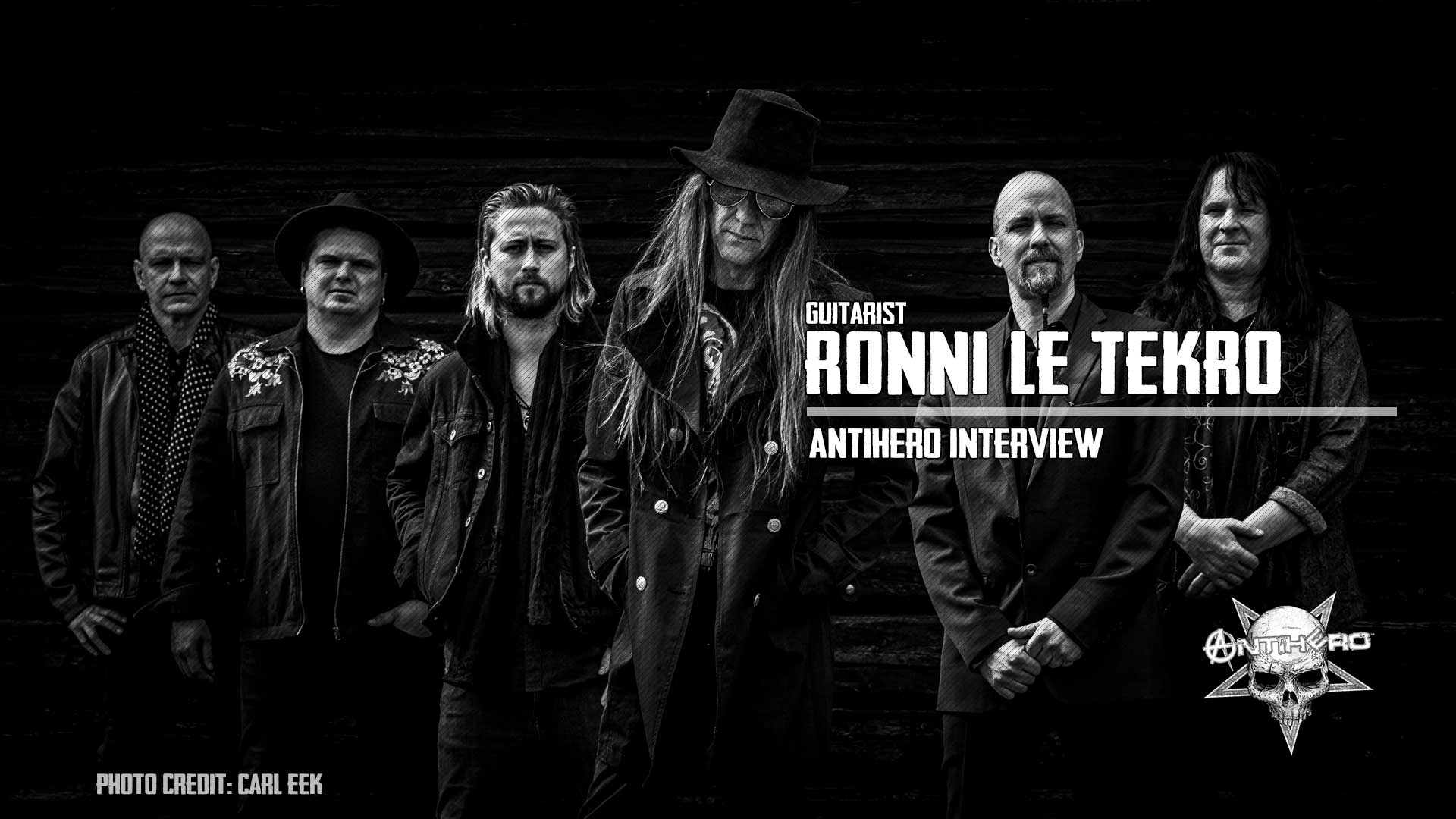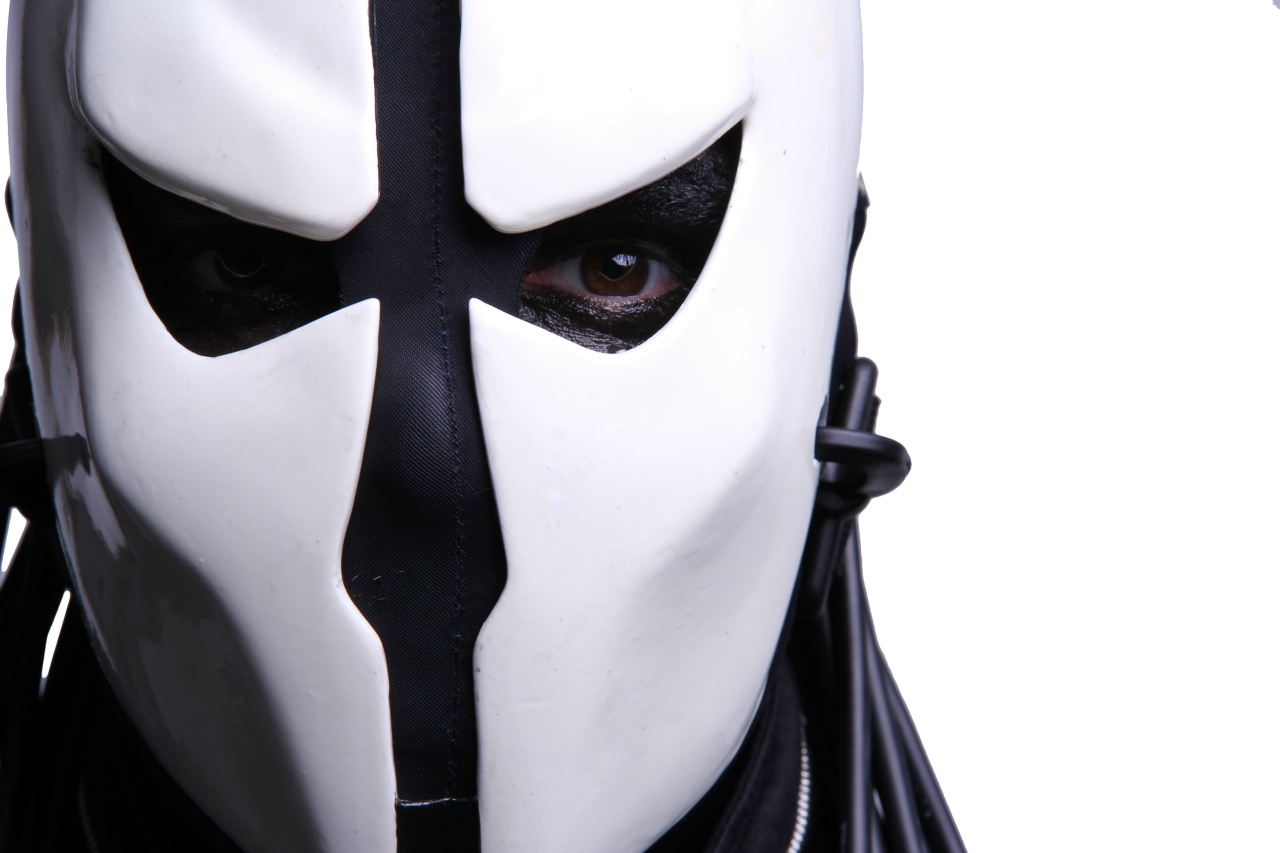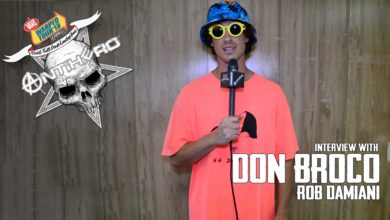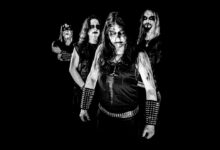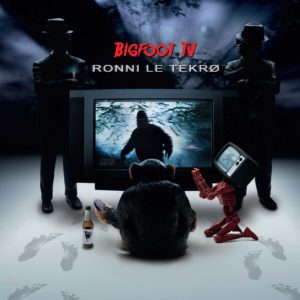 Growing up in the ‘80s-era of big hair melodic rock music TNT were one of the bands that registered quite early on my musical radar as their first couple of albums were snapped up, added to my album collection, and played regularly. While the band has undergone many line-up changes one constant has been their innovative guitarist, Ronni Le Tekro. He has also embarked on a solo career in tandem with that of the band. On the release of his first solo album ‘Bigfoot TV’ which is his first in six years. Backed by his tight band, ‘Bigfoot TV’ sounds inspired and vibrant, Ronni’s brilliant guitar work threads through the album, with a musical nod to everyone from TNT to Thin Lizzy, the Beatles, David Bowie, and Ronni’s own progressive rock albums. I was lucky enough to recently have a chat via Zoom with Ronni, himself.
Growing up in the ‘80s-era of big hair melodic rock music TNT were one of the bands that registered quite early on my musical radar as their first couple of albums were snapped up, added to my album collection, and played regularly. While the band has undergone many line-up changes one constant has been their innovative guitarist, Ronni Le Tekro. He has also embarked on a solo career in tandem with that of the band. On the release of his first solo album ‘Bigfoot TV’ which is his first in six years. Backed by his tight band, ‘Bigfoot TV’ sounds inspired and vibrant, Ronni’s brilliant guitar work threads through the album, with a musical nod to everyone from TNT to Thin Lizzy, the Beatles, David Bowie, and Ronni’s own progressive rock albums. I was lucky enough to recently have a chat via Zoom with Ronni, himself.
ANTIHERO: You’ve got a new album about to come out. It’s been six years since your last album, why so long?
Ronni Le Tekro: You know, I’ve been occupied playing with other projects just to make a living, like a hired gun. And, we have been touring some with TNT, until corona of course. So, the days just fly.
ANTIHERO: So, you’ve been keeping busy, the pandemic of the last two years hasn’t held you back in terms of being able to work, being able to create?
Ronni Le Tekro: It’s been nice in that respect because I’ve been able to dig into creating new music. And yeah, so I think maybe that was more shocking. So, I isolate myself and make new music.
ANTIHERO: Obviously though you’ve had very limited opportunities in terms of being able to tour. I don’t know what it’s like over there, but here in the UK, a lot of bands haven’t been able to play live. And it’s only now that they’re able to start playing live again. How has it been over there for playing live?
Ronni Le Tekro: It’s been critical, I think, for all the bands. It’s been almost two years without almost no touring. I’ve been touring maybe 20, 30 shows last year, with various acts and stuff. But that’s not enough to make a living, right? So, I think it’s been hard for everybody, but keep the faith and I think now it’s obviously going to open up, so…
ANTIHERO: So, what about the album itself? When was it created? Was it recently, over the last couple of years? Or did it originate before that?
Ronni Le Tekro: I would say last year. It was a compressed writing process and rehearsing and…. Bigfoot TV is the name of the album. And it’s evolving around personal experiences. There’s one track called UFO, which is about a UFO experience I had some years back, like a close encounter. Which is dangerous to talk about these things, right? Because people think you’re a fucking lunatic or something, right?
ANTIHERO: I know, yeah. I’ve managed to hear the album. I was sent over the album in advance of this chat. Quite a mix of subjects there, everything from UFOs to your cat. Extremely diverse in terms of the subject matter clearly.
Ronni Le Tekro: Yeah, you have been able to listen to the whole album? Great. I would say and, it’s very inspired by… I mean, it’s obvious that I’m inspired by British rock, so City Boy and Pilot, all my favourites, Be-Bop Deluxe, et cetera, et cetera. So, it’s got that element of, I would say, progressive power pop or something. I don’t know how to explain it.
ANTIHERO: I think as well, what’s been going on over the last two years, artists always sought inspiration from the world around them. Has what’s been going on in the world with the pandemic, has that impacted your creativity? Is it difficult? Has it made your writing, your style, your creation darker and more negative?
Ronni Le Tekro: Yeah. I think it’s darker, the lyrics. And more than just a topic in one way. But on the other hand, it’s more melodic too. I don’t know. And I think I play more guitar solos on this album than in a while. So, I think it was an outlet for creativity. And I mean, I live in the deep forest, so there’s practically just a couple of moose here and that’s it.
ANTIHERO: So, I mean, all this isolation, that was new to a lot of people in the world. It’s something that you live with on a regular basis.
Ronni Le Tekro: Yeah. I mean, loneliness is a terrible thing. And I think a lot of people have been feeling that not being able to go out and have a social life and feel human in a sense. Because now it’s obvious that it’s through culture and music and stuff we live, right?
ANTIHERO: You’re also known as a very spiritual person. Did what was happening around you test your own personal faith? Did it challenge that a little bit more than maybe you’ve had in the past?
Ronni Le Tekro: Yeah. I think I got more sensitive to everything around me. So, for instance, on the last track on the album called Ice Of The Woods, I had this very specific feeling that the trees were watching me, that they have some kind of communication. And then I saw, then I saw this logger started cutting down the forests, this beautiful forest. And I was thinking, “Fuck you, dirty old bastard. You’re killing the trees.” Et cetera.
Because obviously then I realised that these are oxygen creators, the trees. And I’m very completely dependent. So, I think Corona also showed me that the trees are my sisters and brothers in a way. Which sounds weird but I think a lot of people have the same feeling.
ANTIHERO: I mean, it’s more difficult for people that are living in the towns to feel connected with nature. But obviously, where you live, you obviously feel more of that bond between man and nature, more so than a lot of people might feel.
Ronni Le Tekro: Yeah, I try to do it. It’s hard in this industrialized world. But obviously, I see this microcosmos in nature and I really connect with any type of nature. It could be in England or Norway, wherever. That’s where I feel like I’m a full person in a way, just walking in the forest makes me… The worries are gone.
ANTIHERO: Do you care a lot about environmental issues and what men are doing for the world?
Ronni Le Tekro: I do.
ANTIHERO: Is that something you get actively involved in? Environmental /global issues?
Ronni Le Tekro: Yeah, I’m involved in human issues like Amnesty I’m quite involved in, and World Wildlife Fund. So, I do stuff for both nature and for different cancer associations. I play concerts and Children’s Cancer Association over here for instance. And yeah, I try to participate where I can. The shitty thing is that it’s men my age, 58, that’s fucking up the world. So, it’s time to pull the break, but rock is going to save the world again like in the ’60s and the ’70s, rock is going to save the world.
ANTIHERO: It never goes away. And of course, outside of your solo career, you’re synonymous, you’re the only original member left of TNT.
Ronni Le Tekro: Yeah.
ANTIHERO: Does that band still have a future in terms of recording new music, doing gigs? Obviously, you’ve had in the band, your fair share of personal tragedy over the years.
Ronni Le Tekro: Yeah, definitely. We’ve had some tragedy, some serious illness for different members. But I think maybe in the future that we could make the very last album. We’re obviously going to continue touring in whatever line-up, with whatever line-up. But if there’s going to be new music, I’m not sure. I’ve started writing some stuff. I can’t stop. I can’t stop.
ANTIHERO: With your guitar playing, and your ability… your talents as a guitarist are widely renowned and praised. Does it become more difficult or easier as you get older to stay that one step ahead of everybody else in terms of innovation, creatively? Is it difficult to remain an innovator in terms of doing something different?
Ronni Le Tekro: Yeah, I understand what you’re saying. I’ve had that, I think, that I didn’t feel that nothing new happened with my guitar playing for maybe let’s say maybe five, six years. But if you continue and if you’re open, it’s going to loosen up once again, then creativity is going to flow. And then again, I try to work my creativity within my own little weird style. So, I don’t measure it against other guitar players in a way. I just have my own little measurements for what I think is good or… And sometimes I’m wrong. And sometimes people love it, sometimes they hate it.
ANTIHERO: Do you feel you’re still learning as a musician, that never stops?
Ronni Le Tekro: It never stops. Every day I learn something new. And that’s interesting because I wish I had another life, that I could play guitar for another 50 years. But that’s obviously not going to happen.
ANTIHERO: So outside of music, do you have any interests or hobbies? Or is music just so totally your life? Do you do anything outside, maybe different from music, maybe sports, maybe hobbies?
Ronni Le Tekro: I can canoe on the rivers. I do that in the summertime. I go hiking far because in Norway anyone can hike anywhere. The private property law is not very strong here. So, I guess that’s why a lot of British people come hiking here too, and they’re free to… Norway’s an expensive country to you if you’re going to stay in hotels and eat in restaurants. But if you go into nature and do that shit, it’s the cheapest place on the planet.
ANTIHERO: Coming up then, touring plans. Obviously, once an album is released, the songs only come alive when you perform them for fans. Do you have any concrete, definite touring plans or is everything still up in the air in terms of touring?
Ronni Le Tekro: Yeah, yeah. No, the album comes out on the 18th of March and then I start touring that same day in Oslo, the capital. Then I play two shows in Bergen, which is another Norwegian city. And then I continue doing six or seven shows to support the release over here. And then I guess I’m just going to keep on touring.
ANTIHERO: All around the world?
Ronni Le Tekro: If they want me.
ANTIHERO: If you can get into countries. I think that’s a major issue for bands these days, where they’re willing and they want to get back to touring. But because of the border restrictions and COVID restrictions, they can’t tour where they want to. Because countries are not letting people in, so it makes any touring plans very difficult.
Ronni Le Tekro: It’s hard to see it. It was hard to see any future, but now it seems like… But we are going to see the long effect of the COVID in the culture, in culture too. It’s going to take fucking years to get the clubs back in shape and general economy too, for everybody. I mean, we’re all in the shithole now, so…
ANTIHERO: Yeah. I don’t think it’s going to go away. It’s just I think more a case of adapting and just getting on with our lives again or trying to.
Ronni Le Tekro: Yeah, we just got to do that. And of course, touring is, if this continues… it’s a risk too. So, I don’t know how many bands are willing to do it. And if they have underlying diseases, for instance, for a couple of members, then it’s… Honestly, I don’t know. But it seems like it’s vanishing now.
ANTIHERO: Yeah, hopefully. Just a final one then, I’m sure you’ve done many interviews over the years. If you could sit down with a personal hero, somebody’s inspired you, who would you like to interview yourself? Who’s inspired you? Maybe not a musician, do you have any people in your life who have personally inspired you?
Ronni Le Tekro: I would say, Joe Walsh. I would love to have an interview with him. It seems like we’re formed in a similar way regarding lyrics and riffs and many things, right?
ANTIHERO: You think you would have a lot in common there outside of the guitar, where do you find your creative inspiration from?
Ronni Le Tekro: I think we would struggle because obviously, he doesn’t have a drink anymore and I would have a whiskey and then we would have a problem, right?
ANTIHERO: Yeah. Thank you very much for talking to me. Good luck with the album and hopefully you’ll get over to Europe and the UK and play some live shows again.
Ronni Le Tekro: I hope to see you one day, my friend.
ANTIHERO: Definitely.
Ronni Le Tekro: Thank you for the interview, Mark. Thank you.
ANTIHERO: Thank you very much for talking to me. Thank you very much.

